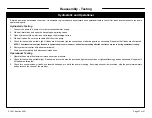
F
−
1031, Section 4321
Page 57 of 57
Reassembly - Testing
Hydrostatic and Operational
Before a pump can be returned to service, it is advisable to give the pump a hydrostatic and operational tests to check it for leaks and to make sure the pump
operates properly.
Hydrostatic Testing
1.
Connect the pump to a hydrant or other pressurized water supply.
2.
Close all drain lines and open the discharge and priming valves.
3.
Open hydrant until the water runs out through the discharge valves.
4.
Close all valves. Be sure to evacuate all air from the pump.
5.
Check for leaks with a portable light. If leaks are discovered, tighten connections or attaching parts as necessary. Repeat until all leaks are eliminated.
NOTE: The mechanical seal may leak under hydrostatic pressure; however, it should stop leaking after the seal faces are run in during operational testing.
6.
Shut hydrant valve after all leaks are eliminated.
7.
Drain pump completely and disconnect intake hose.
Operational Testing
1.
Operate the pump at its maximum intended service pressure.
2.
Check for leaks with a portable light. If leaks are discovered, stop the pump and tighten connections or tighten attaching parts as necessary. Repeat until
all leaks are eliminated.
3.
Check for unusual noises, oil leaks, overheated bearings, etc. while the pump is running. If anything unusual is discovered, stop the pump immediately
and determine the cause of the problem.

































